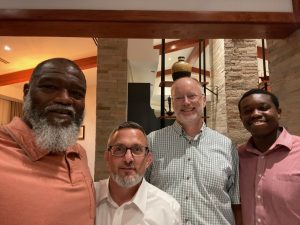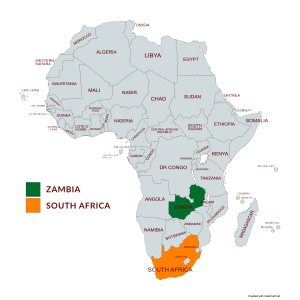TAZARA RAILWAY LINKING ZAMBIA AND TANZANIA: PHOTO BY KATSUMA TANAKA ON UNSPLASH
Part II* – Zambia
(Read Part I)
In September, 2023, a few weeks before David Goodwin and Tim Dernlan (ACCS president and vice president, respectively) were scheduled to depart for Africa, they received a phone call. Lennox Kalifungwa, who had met David only a few weeks prior, had heard they were speaking at Rafiki Foundation conferences in Uganda and Kenya, and asked if they could stop by Zambia.

From left: Voddie Baucham, Tim Dernlan, David Goodwin, Lennox Kalifungwa, October 2023
Three weeks later, over 100 people gathered at Lusaka Baptist Church in Lusaka, Zambia, for an event titled “God’s Purpose and Plan for Education” where many would hear about classical Christian education (CCE) for the first time.
Lennox talked with The Classical Difference about his mission to bring CCE to Zambia.
Q: What motivated you to organize the conference on such short notice?
A: The CCE movement is all over the world, and if you’re in it, you’re bound to encounter like-minded folk. Earlier this year, Ben Merkle [president of New Saint Andrews College] and I connected, and have since become good friends. He came to Zambia for a conference hosted by Africa Christian University (ACU) and a few weeks later, I visited New Saint Andrews where I met David Goodwin, who was speaking at a conference. I was aware of Battle for the American Mind and the ACCS. When I heard he was coming to Africa with Rafiki, I saw an opportunity for the Zambian church to learn about classical Christian education from a different voice than mine.
Over the years, I’ve developed an insatiable desire to build distinctly Christian culture, and I think the key to achieving that, especially in this part of the world, is CCE. I work closely with ACU to help establish the Christian foundations Zambia needs, and I believe that creating classical Christian k-12 schools is at the top of our priority list. I was able to organize the conference in a few weeks, which was fun and a great privilege to put together with the help of my friends. My church and a local Christian school hosted the event and it was an overwhelming success.
Q: What influenced you to pioneer classical Christian education in Zambia?
 A: When I was still a young boy, our family left our native Zambia for my father to pastor a church in South Africa, just a few years after apartheid had ended. Interestingly, we were among the church’s first black members. Our church was absolutely amazing—sound, serious, knowledgeable. I made lifelong friendships there and it was wonderful for our family as a whole. We imbibed a culture within our church that was distinctly Christian with an emphasis on family life and living all of life for the glory of God.
A: When I was still a young boy, our family left our native Zambia for my father to pastor a church in South Africa, just a few years after apartheid had ended. Interestingly, we were among the church’s first black members. Our church was absolutely amazing—sound, serious, knowledgeable. I made lifelong friendships there and it was wonderful for our family as a whole. We imbibed a culture within our church that was distinctly Christian with an emphasis on family life and living all of life for the glory of God.
Even outside the church, parts of South Africa’s culture are historically anchored in a Christian heritage. As America had its pilgrims from Europe, South Africa had Dutch Puritans who moved from Holland to South Africa several centuries ago. I believe it is because of that Christian worldview and Puritan influence that South Africa developed faster and with better infrastructure than other countries in Africa. Generally, we lived among people who possessed a “Protestant work ethic”—which I see as describing people who value virtue and who create and care to propagate beauty in their vocation. Those things were very good for me to witness and experience.
My parents were passionate about education. After coming across resources by Tedd Tripp, Doug Wilson, and several others while helping to found a Christian school with our church, they began implementing a “semi-classical” approach. They later homeschooled me and my two younger brothers in Zambia, deepening my exposure to CCE.
We returned to Zambia because my father realized how much more need there was for him there.
And it didn’t take me too long after we moved to see the glaring cultural differences. Unlike South Africa, Zambia had less of a Christian heritage that fundamentally shaped the culture. While South Africa and America might be abandoning their Christian roots, Zambia never really had them—and they had no way to understand Christianity as we had come to understand it. Zambia is in many ways a new country. My father wanted to start building a distinctly Christian culture through the propagation of a Christian worldview.
Q: What are the main challenges to starting a classical Christian school in Zambia?
A: Zambia is a third world country. It lacks reliable infrastructure, relies heavily on foreign aid, and has a huge lower class.

Zambia, Victoria Falls: Photo by Paul Milley on Unsplash
Beyond that, countries that nurture a suspicion of Western thought make intentional efforts to ensure it does not gain a foothold. Many people are opposed to Christian education because Christianity is associated with the West and is seen as a tool that facilitates colonialism. They reject Christianity to reject colonialism, which in their minds must also include a rejection of capitalism. Zambia operates on a socialist framework because of its anti-western commitments, and not because it has proved effective. Many countries including Zambia feel they have more in common with places that have been influenced by Marxism, as an alternative to colonialism. To propagate CCE, these cultural idols must be addressed.
Similar to what I see happening in America, many believe education’s main goal is to create good citizens who can work as gainful taxpayers. The State is viewed as an all-encompassing authority that controls almost everything, including education and the economy. In addition, Zambia has high levels of corruption in many of its civil institutions This makes it difficult for people to innovate, be enterprising, and create wealth for themselves. I anticipate a long uphill battle, but CCE will win anyway.
In some ways, Zambia embodies what America might become if they persist in their secularism. The ideas taking hold of America today have already been employed in other places across the world and have colossally failed. America is more developed than Zambia, but is the same in that it shares a growing sympathy for welfare socialism. Zambia serves as an example of the consequence of normalizing state welfare and having the state preside over everything. These ideas produce people with crippled minds who have a crippling misunderstanding of freedom, who have little to no regard for ethics and virtue, and who exist to consume rather than to build. Poverty becomes propagated once this path is pursued. When people fundamentally do not fear God, chaos and disorder ensue.
Q: What is the most common question people ask about establishing CCE in Zambia?
A: The most common question is, “Is this going to be a good fit for Zambia?” While I was homeschooled, I studied the American founding fathers and the vision they set for their country. This, and my cultural upbringing, explain why I can relate to an American audience in my work and writing. I have a keen passion and deep respect for America. I hope that Zambia and many other African countries can learn about the best America has to offer, although a lot of those lessons are set in the past. America’s Christian foundations made it the great country it is today and I would love to see it return to its old ideals.
How does this relate to whether classical education is a good fit in Zambia? The root of that question is really this: Why propagate what is perceived to be Western thinking? I think and believe that truth, beauty, and goodness transcend ethnic, cultural, and national distinctions. The kingdom of God is an inevitable global phenomenon and not merely a Western construct. It should have far reaching effects and implications around the world. In classical education we’re not just learning Western thought, we’re trying the best ideas of those who went before to see where they did well or poorly to build something right where we stand. I live on the continent of Africa but I am part of a classical Christian heritage that I can learn from and wholeheartedly embrace—and I hope many others in Africa can do the same.
I’ve lived between cultures and that often prompts the question, where’s home? Or where do I belong? It can be a perplexing question. I find myself at home with like-minded people wherever I am. I have more in common with biblically minded Christians from different parts of the world than I do my own kin. Knowing I can build culture to establish God’s kingdom on earth rather than consume whatever culture exists around me has liberated me.
Classical Christian education has freed me to be a person who creates and builds Christian culture for the glory of Christ—to be a true citizen of God’s Kingdom—everywhere I go. ✤
LENNOX KALIFUNGWA earned his baccalaureate in business from the University of Greenwich. He is a writer, Christian thinker, and professional communicator whose work has been published by various American news agencies including Forbes, The Republic Sentinel, The American Thinker and various others. His passion is for cultural apologetics and Christian worldview formation, and he frequently speaks at colleges, churches, conferences, and other venues. He and his wife have three children (all three years old and under).










